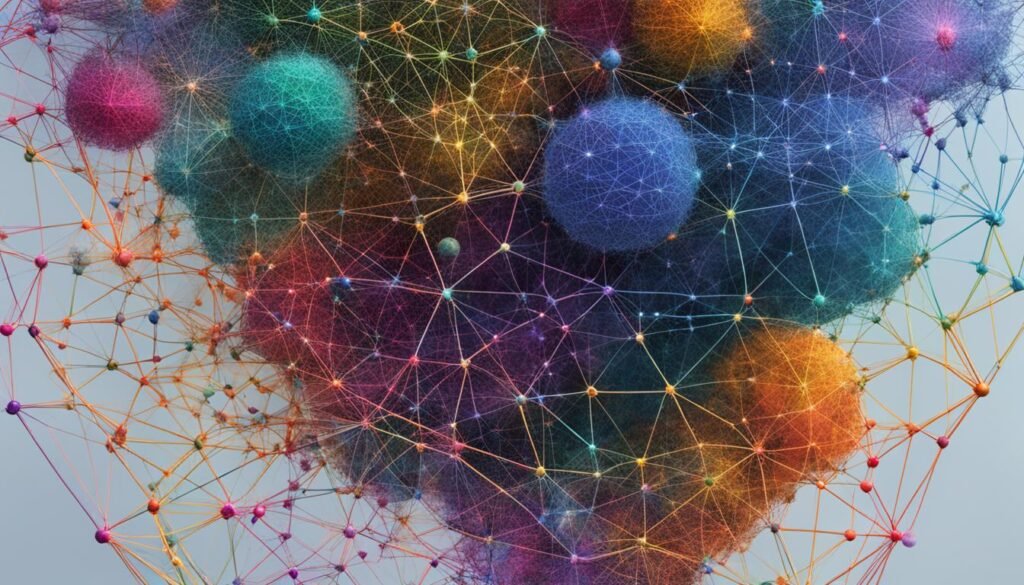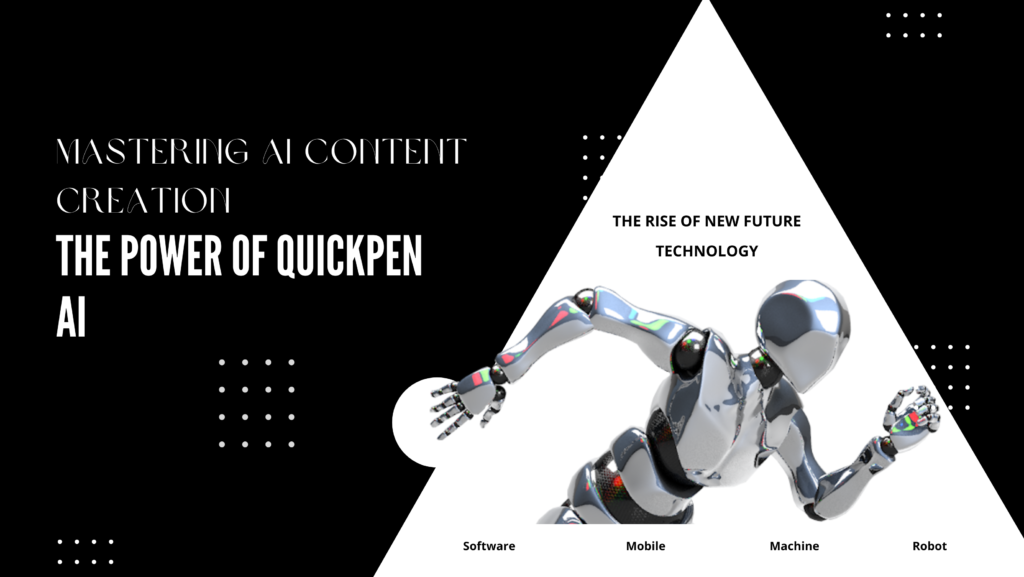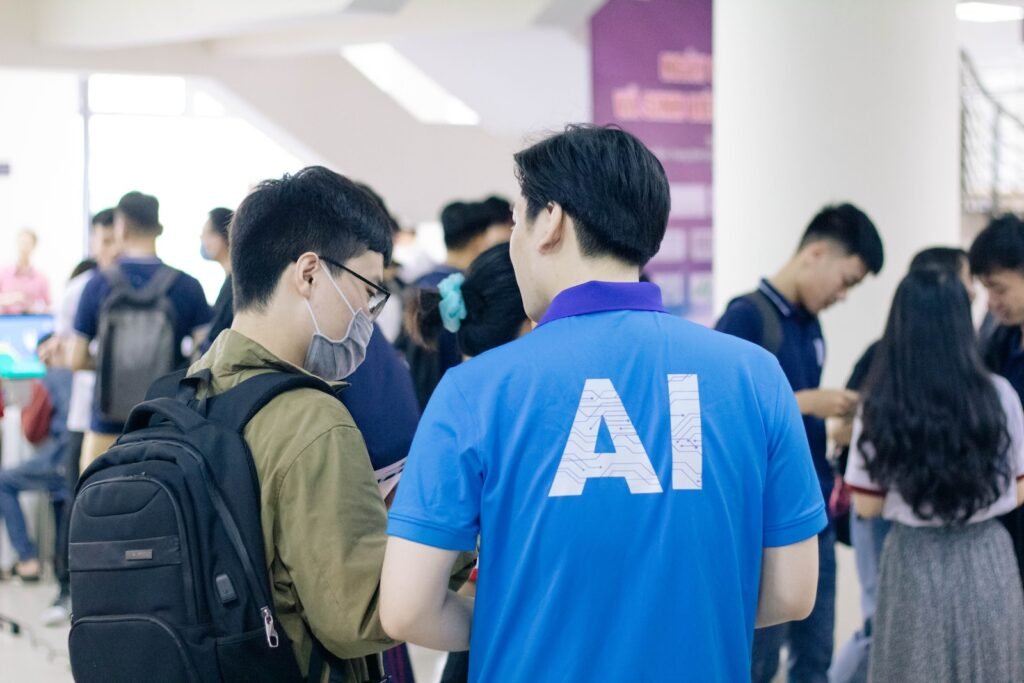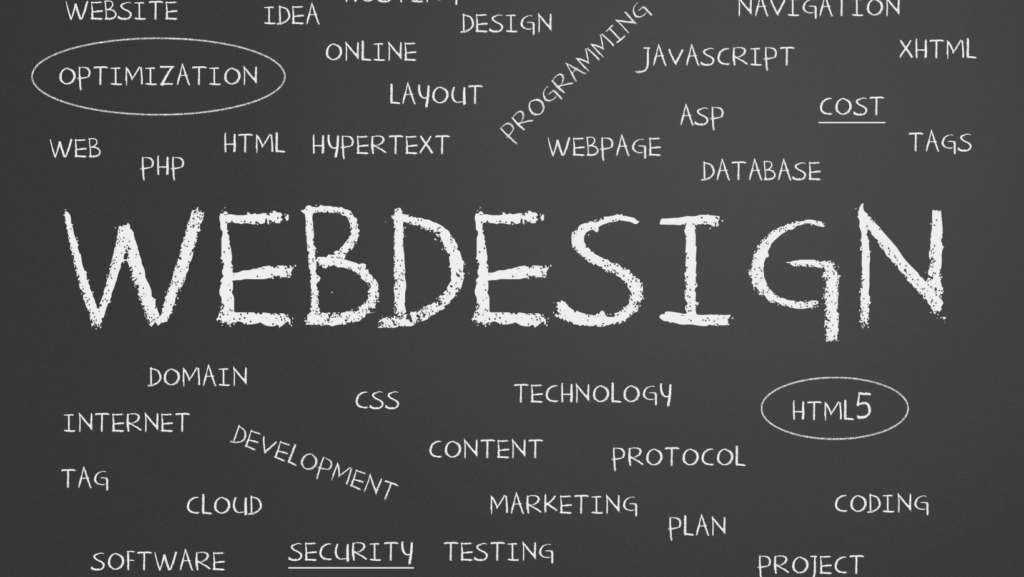The future of ChatGPT is filled with exciting possibilities, as advancements in chatbot technology and AI-powered language models continue to evolve. From enhancing natural language processing to breakthroughs in conversational AI, the next-generation of chatbots is set to revolutionize various industries.
One of the primary driving forces behind this transformative future is the evolution of GPT-3. This cutting-edge AI model has already made notable advancements, but the question remains: what’s next for GPT-4 and beyond? As we delve into the journey from GPT-3 to GPT-4, we’ll explore the expanding capabilities in understanding and generation of human-like text, as well as the significance of expanded data processing and real-time adaptation.
This article also highlights the shift from generalist to specialist applications in AI. As ChatGPT and other AI models become more specialized, they can provide more targeted and efficient solutions, even with limited data. This development opens up new possibilities for startups and smaller companies to create AI models that are tailored to specific industries and domains.
Machine learning integration plays a vital role in strengthening the core of ChatGPT. With the incorporation of edge AI for real-time, decentralized solutions and continuous improvement through advanced machine learning algorithms, ChatGPT can deliver enhanced user experiences and responses that constantly improve over time.
While the potential of AI is immense, ethical considerations are paramount. As we delve into the expanding ecosystem of conversational AI and the impact of emerging technologies on natural language processing, we must ensure that AI advancements align with ethical standards and human values.
The future of ChatGPT holds the promise of fostering global connections, breaking language barriers, and disrupting industries with its AI-powered efficiency and accuracy. By overcoming limitations and addressing biases, we can unlock the full potential of ChatGPT and shape a future where AI and human needs go hand in hand.
Key Takeaways:
- Advancements in chatbot technology and AI-powered language models are shaping the future of ChatGPT.
- GPT-3 has played a transformative role in AI, but the evolution to GPT-4 and beyond is on the horizon.
- Specialized applications and limited data are driving the shift from generalist to specialist AI models.
- Machine learning integration strengthens ChatGPT’s core, enabling real-time, decentralized solutions and continuous improvement.
- Considerations for ethics and human values are crucial in the development and use of AI models like ChatGPT.
The Diverse Applications and Growing Reach of ChatGPT
ChatGPT is revolutionizing the way we interact with AI-powered conversational models. Its diverse applications and growing reach are paving the way for exciting advancements in various industries. From enhancing customer experience and business operations to unlocking educational opportunities and revolutionizing healthcare, ChatGPT is making its mark.
Impact on Customer Experience and Business Operations
Businesses across the globe are leveraging ChatGPT to transform customer experience and streamline their operations. With its ability to handle a wide range of inquiries and provide personalized support, ChatGPT is elevating customer service to new heights. It can efficiently answer frequently asked questions, troubleshoot issues, and even assist in sales processes, ensuring an enhanced and seamless customer journey.
Furthermore, ChatGPT is empowering businesses to scale their operations by automating repetitive tasks and providing round-the-clock support. This not only improves operational efficiency but also frees up human agents to focus on more complex and high-value tasks.
Unlocking Educational Opportunities and Accessibility
In the realm of education, ChatGPT is unlocking new opportunities and ensuring accessibility for students worldwide. It provides personalized learning experiences and virtual tutoring, catering to the individual needs of students. With its language learning support, ChatGPT assists students in mastering new languages and overcoming barriers to education.
Moreover, ChatGPT is instrumental in fostering inclusive learning environments for students with different learning styles and abilities. Its availability online allows students to access educational resources and support anytime, anywhere. This opens doors to educational opportunities that were previously inaccessible to certain individuals.
Advancements in Healthcare and Mental Health Support
The healthcare sector is also experiencing significant advancements with the integration of ChatGPT. It is playing a crucial role in advancing mental health support by acting as a virtual therapist, facilitating diagnosis, and providing personalized recommendations. ChatGPT’s chatbot capabilities offer a safe and confidential space for individuals to discuss their mental health concerns and seek guidance.
Furthermore, in the healthcare realm, ChatGPT aids healthcare professionals in retrieving relevant medical information quickly, assisting in diagnosis, and ensuring accurate treatment recommendations. It saves valuable time for healthcare providers, enabling them to deliver quality care and improve patient outcomes.
As the applications of ChatGPT continue to expand, we can expect further advancements in customer experience, business operations, education, and healthcare. The potential for ChatGPT to reshape industries and support human well-being is truly remarkable.
Transformative Role of GPT-3 and Beyond in AI
GPT-3 has paved the way for groundbreaking advancements in the field of AI and language models. Its innovative capabilities have pushed the boundaries of what is possible, revolutionizing the way we interact with machines. However, the journey does not end here. The future holds even more exciting prospects with the evolution of GPT-4 and beyond.
From GPT-3 to GPT-4: What’s Next for Language Models?
The next stage of AI language models lies in the development of GPT-4 and its successors. These forthcoming advancements are set to bring about remarkable improvements in the understanding and generation of human-like text. With each iteration, language models will become more adept at comprehending context, delivering responses that are relevant and coherent in a conversational setting.
Evolving Capabilities in Understanding and Generation of Human-like Text
One of the focal points of future language models is a deeper understanding of human language. AI systems will continue to advance their ability to comprehend nuances, context, and subtleties inherent in human-like text. This enhanced understanding will facilitate more meaningful and contextually appropriate conversations between humans and AI models.
Expanded Data Processing and Real-time Adaptation
In addition to understanding human-like text, language models of the future will possess expanded data processing capabilities. These models will be able to handle and analyze larger datasets more efficiently, allowing for a more comprehensive understanding of the information they are presented with.
Real-time adaptation will also play a vital role, enabling language models like ChatGPT to quickly adapt and respond to new information as it becomes available. This will ensure that AI models can provide up-to-date and accurate information, enhancing their utility and relevance in real-world scenarios.
AI’s Journey from Generalist to Specialist Applications
Artificial Intelligence (AI) has come a long way, evolving from generalist applications to more specialized domains. Initially, AI models like ChatGPT were capable of handling a wide range of tasks thanks to their reliance on vast amounts of data. However, as AI technology advances, there is a shift towards developing specialized applications that can operate effectively even with limited data. This development opens up opportunities for smaller companies and startups to create AI models with enhanced functionality and improved efficiency in specific domains.
“The future belongs to specialized AI models that can excel in specific fields, catering to niche requirements and delivering superior performance.”
By embracing specialization, AI can cater to the unique needs of various industries and domains. Instead of relying on a one-size-fits-all approach, companies can now leverage AI models tailored to their specific requirements. Whether it’s healthcare, finance, retail, or any other sector, specialized AI models can offer targeted solutions, leveraging domain-specific knowledge and expertise. These models can streamline processes, make accurate predictions, and provide valuable insights, helping businesses achieve their goals more efficiently and effectively.
Specialized AI models also address the challenges associated with training large generalist models. Training AI models with limited data becomes more feasible when focusing on specific tasks or domains. This allows for faster training, reduced computational costs, and improved performance in targeted applications. Companies can now leverage the expertise of smaller specialized AI models to achieve similar or even better results than their more generalist counterparts.
Comparing Generalist and Specialist AI Applications
| Generalist Applications | Specialist Applications | |
|---|---|---|
| Data Requirement | Relies on large amounts of data | Operates effectively with limited data |
| Training Time | Longer training time due to complex models | Faster training as models are more focused |
| Performance | Good general performance across multiple tasks | Excellent performance in specific domain |
| Scalability | May struggle to scale to new tasks | Easily adaptable to new tasks |
| Efficiency | May have unnecessary features for specific tasks | Streamlined and efficient for targeted tasks |
As AI’s journey continues, the trend of specialization is set to reshape the industry. While generalist AI models still have their place, the future belongs to specialized AI models that can excel in specific fields, catering to niche requirements and delivering superior performance. By leveraging the power of specialization, AI will unlock new possibilities and drive advancements in various industries, revolutionizing the way we work, communicate, and solve complex problems.
Machine Learning Integration: Strengthening ChatGPT’s Core
Machine learning integration is a key factor in bolstering the core capabilities of ChatGPT, enabling it to deliver more advanced and efficient conversational experiences. By incorporating cutting-edge machine learning algorithms, ChatGPT continually improves its performance and enhances its ability to understand and respond to user queries.

Incorporating Edge AI for Real-time, Decentralized Solutions
One of the significant advancements in machine learning integration is the incorporation of Edge AI. This innovative approach allows ChatGPT to process data locally on devices, enabling real-time and decentralized solutions. By minimizing latency and taking advantage of local resources, Edge AI enables faster data processing and ensures improved data privacy.
Continuous Improvement through Advanced Machine Learning Algorithms
ChatGPT’s core capabilities are continuously enhanced through the application of advanced machine learning algorithms. These algorithms enable ChatGPT to learn from new data and user interactions, leading to continuous improvement in response accuracy and relevance. As ChatGPT gathers more experience, it becomes more adept at understanding context and providing nuanced and contextually appropriate responses over time.
| Advantages of Machine Learning Integration | Edge AI | Continuous Improvement |
|---|---|---|
| Real-time solutions | Enables faster data processing | Enhances response accuracy and relevance |
| Decentralized solutions | Optimizes data privacy | Improves contextual understanding |
| Minimizes latency | Refines language generation |
The integration of machine learning algorithms and Edge AI empowers ChatGPT to provide real-time, decentralized solutions with improved data processing capabilities and enhanced response accuracy. This integration ensures that ChatGPT remains at the forefront of AI-powered conversational models, delivering transformative conversational experiences to users across various domains.
AI Ethics and the Human-AI Relationship
As AI technology continues to advance, it is crucial to consider the ethical implications and the impact on the human-AI relationship. Ethical considerations are paramount in ensuring that AI is developed and used in a responsible and trustworthy manner. Privacy and data security are essential aspects to be addressed, as they safeguard individuals’ rights and ensure that their personal information is protected.
Bias in AI models is another critical area to focus on. It is essential to identify and mitigate biases to ensure fairness and equity in AI systems. By addressing biases, we can prevent AI from perpetuating discrimination or stereotypes and create models that are unbiased and representative of diverse populations.
Furthermore, as AI becomes increasingly integrated into our daily lives, it is crucial to strike a balance between the capabilities of AI and human values. While AI can automate tasks and enhance efficiency, it is essential to remember that AI should be a tool that aids human decision-making rather than replacing human judgment entirely.
The human-AI relationship must be built on trust and transparency. Clear communication and explainability of AI systems are vital for users to understand how AI functions and the limitations it may have. Open dialogue and collaboration between AI developers, researchers, and users are key to advancing AI technology responsibly.
“AI is a powerful tool that has the potential to transform industries and improve our lives, but we must ensure that it aligns with our ethical values and respects human rights.”
By considering the ethical implications and nurturing a strong human-AI relationship, we can harness the full potential of AI technology while maintaining trust, responsibility, and a focus on the well-being of individuals and society as a whole.
Future of ChatGPT
Fostering Global Connections and Breaking Language Barriers
The future of ChatGPT holds immense potential for fostering global connections and breaking language barriers. As ChatGPT continues to improve its multilingual capabilities, it will enable seamless cross-cultural communication and bridge the gap between different languages and cultures.
Imagine a world where language is no longer a barrier to meaningful communication. ChatGPT’s advancements in natural language processing and machine learning are paving the way for a future where people from diverse backgrounds can connect, collaborate, and understand each other effortlessly.
In a globalized society, the ability to converse fluently in multiple languages is becoming increasingly valuable. Whether it’s for business, travel, education, or simply building connections, speaking and understanding different languages is a gateway to new opportunities.
ChatGPT’s multilingual capabilities eliminate the need for human translators, making communication more efficient and accessible. It empowers individuals and organizations to engage with a global audience, expand their networks, and create positive cross-cultural exchanges.
By breaking language barriers, ChatGPT opens doors to new collaborations, fosters cultural understanding, and promotes inclusivity on a global scale.
Disrupting Industries with AI-Powered Efficiency and Accuracy
In addition to fostering global connections, ChatGPT has the power to disrupt industries through AI-powered efficiency and accuracy. The transformative potential of ChatGPT extends beyond language capabilities, encompassing a wide range of applications that can revolutionize various sectors.
One such sector is customer service, where ChatGPT can enhance and streamline interactions between businesses and their customers. AI-powered chatbots can handle customer inquiries, provide real-time assistance, and offer personalized recommendations, all with a high level of efficiency and accuracy.
Content creation is another area where ChatGPT can make a significant impact. It can generate engaging blog posts, articles, and social media captions with minimal human intervention. This enables content creators and marketers to focus on higher-level tasks, while ChatGPT takes care of the content generation process.
Moreover, ChatGPT can contribute to the healthcare industry by providing virtual medical assistance, aiding in the diagnosis of symptoms, and offering personalized health recommendations. This allows healthcare professionals to extend their reach and provide quality healthcare services to a larger population.
Overall, ChatGPT’s AI-powered efficiency and accuracy have the potential to optimize processes, reduce costs, and deliver high-quality results across various industries. From customer service to content creation, education to healthcare, ChatGPT is set to disrupt the status quo and drive innovation.
Overcoming Limitations: Innovating for Accurate AI Responses
While ChatGPT has undoubtedly showcased its capabilities, it is not without its limitations. However, innovative solutions are being developed to overcome these challenges and ensure more accurate AI responses that truly meet users’ needs.
Enhancing Contextual Understanding and Response Relevance
One of the primary areas of focus is enhancing contextual understanding. By improving the AI model’s ability to comprehend the context of a conversation, ChatGPT can provide responses that are not only relevant but also take into account the nuances and intricacies of the given context.
This development is crucial for ensuring that ChatGPT’s responses align with the user’s query and effectively address their specific needs. By better understanding the conversation’s flow and context, ChatGPT can provide more tailored and accurate responses, enhancing the overall user experience.
Addressing Biases and Factual Inaccuracy in AI Model Training
Another essential aspect of innovation in AI is the rigorous effort to address biases and factual inaccuracies in AI model training. Biases can emerge from the data used to train the model, leading to responses that reflect or amplify existing biases present in society.
Furthermore, AI models may occasionally provide factual inaccuracies due to limitations in their training. It is crucial to rectify these issues to ensure ChatGPT’s responses are reliable and factually correct.
To tackle these challenges, efforts are being made to train AI models on diverse and representative data. By training models on a wide range of perspectives, AI systems like ChatGPT can minimize biases and offer responses that are more unbiased and inclusive.
The ongoing innovation in AI model training aims to improve the accuracy of responses and strengthen ChatGPT’s ability to provide reliable and unbiased information to users.
By addressing limitations, enhancing contextual understanding, and minimizing biases, these innovations are revolutionizing the field of AI and ensuring that ChatGPT continues to deliver accurate, relevant, and trustworthy responses.
The Expanding Ecosystem of Conversational AI
The ecosystem of conversational AI is continuously expanding, creating new opportunities for innovation and collaboration. With the rise of AI-powered conversational agents like ChatGPT, the integration of these technologies into various platforms and tools has become increasingly prevalent. This integration spans across social media platforms, communication tools, and enterprise systems, allowing for a more seamless and widespread adoption of conversational AI in different contexts.

Integrations with Social Media, Communication Tools, and Enterprises
Social media integrations have become a vital component of the conversational AI ecosystem. ChatGPT’s integration with popular social media platforms enables users to interact with AI-powered chatbots directly through messaging apps, providing quick access to information, personalized recommendations, and customer support.
Communication tools such as email clients, collaboration platforms, and chat applications also benefit from conversational AI integrations. By incorporating AI-powered chatbots, these tools enhance communication efficiency, automate repetitive tasks, and improve overall productivity.
Enterprises are increasingly leveraging conversational AI to streamline their operations and improve customer experiences. From virtual assistants handling customer queries to AI-powered chatbots managing employee workflows, the integration of conversational AI technologies in enterprise systems has transformed the way organizations operate.
Creating Cutting-Edge User Experiences with AI
One of the key advantages of the expanding ecosystem of conversational AI is the ability to create cutting-edge user experiences. AI-powered chatbots can provide personalized and interactive conversations, offering users a natural and intuitive way to interact with technology.
Whether it’s an AI-powered virtual assistant guiding users through complex tasks or a chatbot delivering personalized recommendations based on user preferences, conversational AI technologies enhance user experiences by providing relevant and timely information.
Moreover, conversational AI can be integrated into a range of applications, including customer service, healthcare, e-commerce, and more. This allows for the creation of tailored user experiences that meet the specific needs of different industries and user segments.
As the ecosystem of conversational AI continues to expand, we can expect to see further advancements and integration with emerging technologies. This will open up new possibilities for creating even more cutting-edge user experiences and transforming the way we interact with AI-powered systems.
Emerging Technologies and Their Impact on NLP
Emerging technologies are revolutionizing the field of natural language processing (NLP), paving the way for exciting advancements in AI-powered language models like ChatGPT. These technologies encompass a range of cutting-edge developments, including machine learning, deep learning, and neural networks. As these technologies continue to evolve, their impact on NLP is becoming increasingly profound.
The integration of emerging technologies into NLP is resulting in the creation of more sophisticated models and algorithms. This enables AI systems like ChatGPT to better understand, analyze, and generate human-like text. The advancements in machine learning algorithms, for example, have enhanced the contextual understanding capabilities of NLP models, allowing for more accurate and relevant responses.
Furthermore, emerging technologies enable AI systems to process and interpret vast amounts of data more efficiently. Deep learning techniques, such as neural networks, have revolutionized data processing in NLP, empowering AI models to handle complexities and nuances present in language with greater accuracy and understanding.
The impact of emerging technologies on NLP extends beyond improved accuracy and understanding. These advancements also contribute to the development of AI-powered language models that can adapt and learn in real-time. As neural networks become more sophisticated, AI systems like ChatGPT can rapidly integrate new information and adjust their responses accordingly, providing up-to-date and personalized interactions.
In conclusion, emerging technologies are driving significant advancements in NLP, fueling the evolution of AI-powered language models like ChatGPT. The integration of machine learning, deep learning, and neural networks is enhancing the capabilities of NLP models, enabling them to understand, generate, and adapt text with greater accuracy and contextual relevance. As the field continues to progress, the impact of emerging technologies on NLP is expected to shape the future of AI language models, unlocking new possibilities and transforming the way we interact with AI systems.
Conclusion
The road ahead for ChatGPT and AI innovations is filled with exciting possibilities and promising advancements. As AI technology continues to evolve, it is crucial to strike a balance between pushing the boundaries of AI and considering the ethical implications. Privacy, data security, and addressing biases are key factors in building trustworthy AI models that align with human values.
By navigating these challenges and embracing the potential of AI, we can unlock the transformative power of ChatGPT and shape a future where AI works harmoniously with human needs and aspirations. The road ahead involves continuous innovation and refinement, ensuring that ChatGPT remains at the forefront of AI advancements while maintaining the highest ethical standards. This requires collaboration between AI developers, industry experts, and policymakers to create an environment where AI benefits society as a whole.
As we move forward, it is important to address the ethical considerations of AI and establish guidelines that govern its development and use. By incorporating transparency, fairness, and accountability into the AI ecosystem, we can build trust and facilitate widespread adoption of AI technologies. Striking a balance between AI advancements and ethical considerations is not just essential, but also crucial for building a future where AI serves humanity in a responsible and beneficial way.
In conclusion, the road ahead for ChatGPT and AI innovations is paved with immense potential. By harnessing the power of AI, we can revolutionize industries, improve efficiency, and create opportunities for global connection. However, it is vital to ensure that AI advancements are accompanied by ethical considerations, privacy protection, and unbiased decision-making. With responsible development and application, ChatGPT and AI can shape a future that benefits and uplifts society as a whole.
FAQ
What are the diverse applications of ChatGPT?
ChatGPT has diverse applications in customer experience, business operations, education, healthcare, and content creation.
How does ChatGPT impact customer experience and business operations?
ChatGPT improves customer experience by providing personalized and efficient customer support, handling inquiries, and troubleshooting.
How does ChatGPT unlock educational opportunities?
ChatGPT provides personalized learning experiences, virtual tutoring, and language learning support for students.
How is ChatGPT advancing healthcare and mental health support?
ChatGPT acts as a virtual therapist, aids in diagnosis, and provides personalized recommendations for mental health support.
What is the transformative role of GPT-3 and beyond in AI?
GPT-3 has pushed the boundaries of AI and language models and future iterations will further improve text understanding and generation.
What comes next after GPT-3?
The future involves the evolution to GPT-4 and beyond, with improved understanding, data processing, and real-time adaptation capabilities.
How has AI evolved from being a generalist to specialist applications?
AI models like ChatGPT have transitioned from generalist capabilities to specialized applications, allowing for more efficient and effective performance in specific domains.
How is machine learning integration strengthening ChatGPT’s core?
Machine learning integration includes the incorporation of Edge AI for real-time solutions and continuous improvement through advanced algorithms.
What ethical considerations should be made in AI development?
AI development should prioritize privacy, data security, and addressing biases to ensure trustworthiness and alignment with human values.
How can ChatGPT foster global connections and disrupt industries?
ChatGPT’s multilingual capabilities enable cross-cultural communication, while its efficiency and accuracy can revolutionize industries like customer service and content creation.
What innovations are being made to overcome ChatGPT limitations?
Innovations focus on enhancing contextual understanding and response relevance, as well as addressing biases and factual inaccuracies in AI model training.
How does ChatGPT integrate with social media, communication tools, and enterprises?
ChatGPT integrates with these platforms and tools to enable widespread adoption and create cutting-edge user experiences.
What is the impact of emerging technologies on natural language processing (NLP)?
Emerging technologies like machine learning and neural networks enhance NLP capabilities, leading to more sophisticated AI systems like ChatGPT.
What does the future hold for ChatGPT and AI innovations?
The future involves striking a balance between AI advancements and ethical considerations, ensuring the responsible and beneficial use of AI technology.
Source Links






